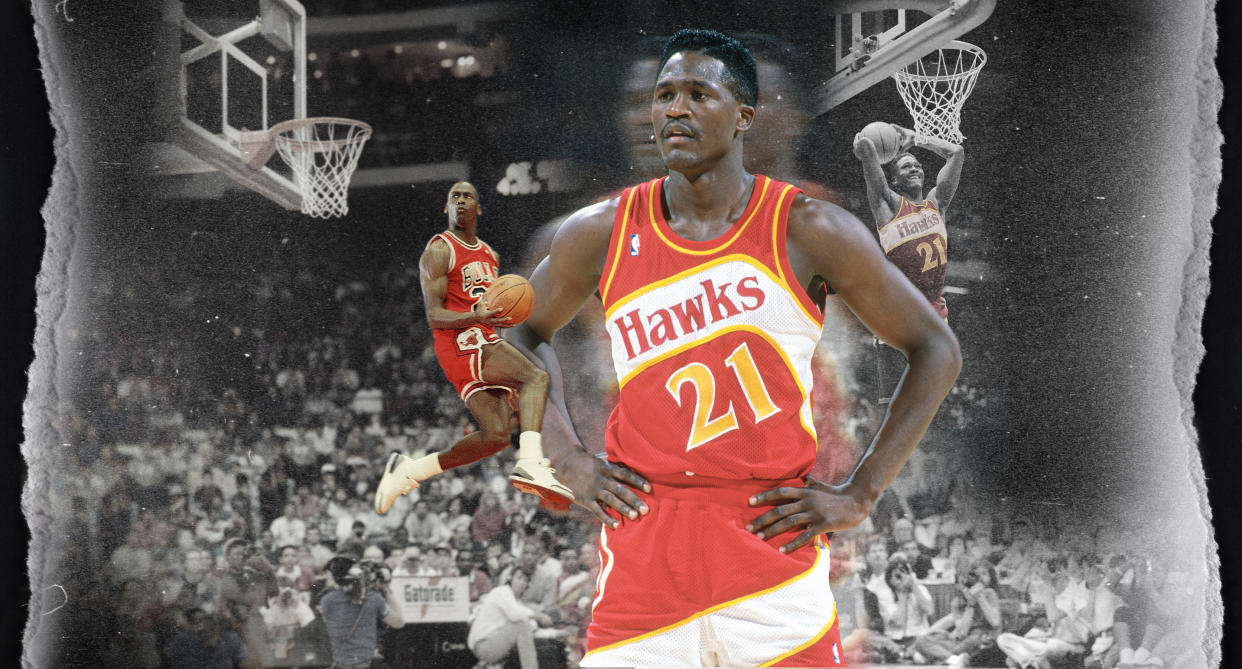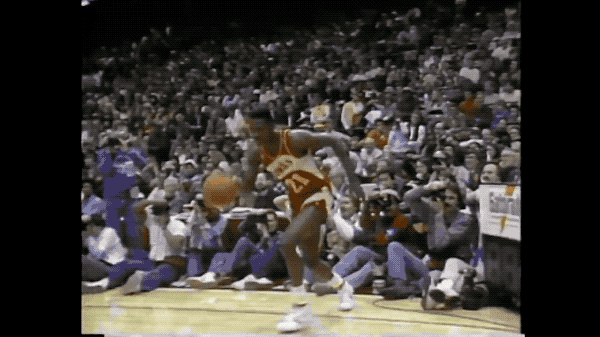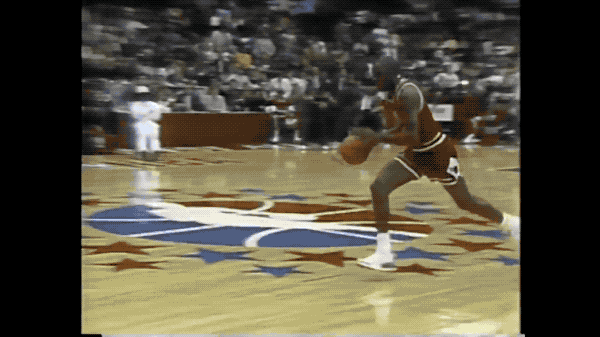Dominique Wilkins recalls dueling with Michael Jordan at the 1988 Slam Dunk Contest

By contemporary dunk standards, it's as old-school as Chuck Taylors and the Amen break. In the moment, it was perfection, coiled fury and defiant athleticism: a two-handed windmill jam that could—should—have won Dominique Wilkins the 1988 Slam Dunk Championship.
Wilkins was locked in mano-a-mano combat with hometown favorite Michael Jordan — or, to be more precise, mano-a-stadium. Wilkins was dunking in hostile territory in Chicago Stadium, and he knew he’d be facing an uphill fight even in the best of circumstances.
Wilkins sized up the court preparing for his final dunk. The five-judge panel had just given Jordan an inexplicable 47 out of 50 for a two-handed cradle dunk, a decision that infuriated the crowd and opened the door for Wilkins to put away the contest. A 48 or better, and he’d own the night.
He stood at the right baseline, took four dribbles—thump-thump, thump-thump—then leaped in the air, brought the ball back almost even with his right ear, and then threw it down so hard the aluminum rim rattled as the ball bounced off his chest.
Was it enough? Wilkins landed facing center court, then strutted toward the left sideline. He slapped fives with Spud Webb, Clyde Drexler and others, and sat down, waiting to see what the judge’s verdict would be, hoping—believing—he’d done enough to hold off the mighty Jordan.

“An honor and a privilege”
We remember the 1988 All-Star Game, and its attendant Slam Dunk Contest, for one transcendent photo—but more on that in a minute. The game itself was one of the high points of 1980s basketball, a time before Shaq and Kobe, before the Dream Team, before the Bulls dynasty. It was a time when, as Wilkins recalls, you didn’t take an All-Star bid lightly, not when you’d be taking the court with guys like Magic Johnson, Isiah Thomas, Charles Barkley, Patrick Ewing and Akeem (later Hakeem) Olajuwon.
“It was an honor and a privilege in those days to be an NBA All-Star,” he says. “It wasn’t easy to make an All-Star team. We were picked by position. One year I averaged 27 points a game, and I still had to beat out Bernard King, Dr. J and Larry Bird, all these established guys.”
Once Wilkins made his first team, though, he was in for most of the next decade, earning nine straight nods. He possessed one of the great nicknames in sports — “The Human Highlight Film” — and he led the Atlanta Hawks to some of the greatest moments in franchise history.
Still, Wilkins couldn’t quite seem to break into that upper echelon of the sport. His Hawks couldn’t get past the Celtics, and he could see that Jordan — at that point still derided as a score-first ball hog — was fast catching up to his own rep as one of the greatest dunkers in the game.
That’s what made the 1988 dunk contest such a big deal. Back then, the biggest names in the sport didn’t dodge the contest, they salivated over it. A dunk-measuring contest was the quickest way to glory in the 1980s NBA, and Jordan and Wilkins loomed the largest.
Also in the mix: Portland’s Clyde Drexler and Jerome Kersey, Golden State’s Otis Smith, San Antonio’s Greg “Cadillac” Anderson, and Wilkins’ Atlanta teammate Spud Webb. But with all due respect to the other competitors, this matchup was a foregone conclusion.
Before an interview on 1988, Wilkins is said to be a little weary of talking about the dunk contest, and you can see why. It’s been 32 years, people, can’t we move on? But it doesn’t take much to get him back in that competitive mindset, to get him thinking about that night three decades ago when the entire city of Chicago picked his pocket.
‘I had to think of something real quick’
Jordan — the defending champion — and Wilkins — the 1985 champion — dispatched the other competitors easily enough, and that left them facing one another for the title. Jordan won the coin flip and deferred, forcing Wilkins to go first.
Wilkins threw his first attempt high off the backboard from the top of the key and slammed it down, a gorgeous dunk that netted him a perfect 50. Jordan followed with a backward two-handed double-clutcher that also garnered a 50.
After one dunk: Wilkins 50, Jordan 50.
As for how much pre-planning went into the dunks, Wilkins answers quickly: “Absolutely none.” Jordan didn’t either, he said; it was all improvisation. “Every time he came with a great dunk, I knew I had to think of something real quick.”
Wilkins then took off from the left baseline and windmilled a 360-degree tomahawk for another 50. Jordan then started from outside the three-point line, bicycling his legs as he threw down another two-handed power jam. It was an impressive dunk, but the judges somehow gave it a mere 47.
After two dunks: Wilkins 100, Jordan 97.
As Jordan prepped, Wilkins sat on the sideline with Drexler and Anderson, scheming. “They would come up with something different, telling me, ‘This is what you’ve got to do,’ ” Wilkins recalls. “The guys were saying, you’ve got to come with a double pump, two hands, something that’s going to offset what he does.”
With just one dunk left, all Wilkins needed to do was come strong with a dunk of 48 points or more, and there was no way Jordan could top him.
Wilkins unleashed that two-handed windmill, then sat down as boos from the crowd — for Jordan’s prior dunk, not Wilkins’ — echoed off the Chicago Stadium rafters. The five-judge panel then made a business decision … and slapped Wilkins with a 45. A 45!
That left Jordan needing a 48 to tie, a 49 to win. You know what happened next.

Jordan dribbled the ball, then — according to legend — he stared up into the crowd and caught sight of none other than Dr. J.
“Julius Erving invented the dunk,” Jordan said. “He told me to go the length of the floor and take off at the free-throw line. It was the best advice I had all day.”
Jordan began at the far baseline, raced down the left side of the court, launched himself into the air right around the foul line, and threw down a one-handed flying power jam, a moment captured by photographers and immortalized for all time.
Jordan pumped his fist as the crowd exulted. The judges deliberated for only a few seconds before returning the expected verdict: 50 points.
Final: Jordan 147, Wilkins 145.
Jordan threw an arm over Wilkins’ shoulder. “We’ll talk about this later,” Jordan said, but according to Wilkins, they didn’t … and never have.
“It’s always been an unspoken thing between us,” Wilkins says. “We knew what we brought to the table.”
“If the contest wasn’t in Chicago, I might not have won,” Jordan said after the contest, and Wilkins, all these years later, still agrees with him.
“I was just disappointed, but I didn’t put too much pressure on myself to where it affected me,” Wilkins says. “I probably should have won, but it was for the fans. I wasn’t bitter, I just wanted to win. That’s our competitive nature.”
Wilkins, like Jordan, remains connected to the game. He’s a color commentator for the Hawks, a constant presence at Hawks home games. Before games, you’ll see everyone from Steph Curry to Zion Williamson taking time out from their warmups to visit with Wilkins and pay homage.
As for that dunk contest? “I hear about it every day,” Wilkins laughs. “I’m 61 and I keep hearing about it!”
Yes, Wilkins got robbed. But so too did Jordan on the dunk just prior. And without Wilkins’ low score, maybe we never get to see Jordan’s free-throw dunk — surely one of the most iconic moments in all of basketball history.
We’ll give Wilkins the final word, and it’s authoritative: “That,” he says, “was the greatest slam-dunk contest ever."
More from Yahoo Sports:

